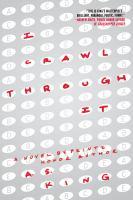
"Challenging" was the first word I heard used to describe this book. I think "surreal" was the next. Following that was "impossible to describe." Even the author herself, when asked to describe the book, talked about the themes and ideas that led to its creation without attempting to describe the plot or characters.
Other descriptions they could have just as accurately used: captivating; insightful; imaginative; perceptive; funny; and enlightening. That this book is unusual isn't the first or most remarkable thing you need to know about it, but that it powerfully and effectively conveys emotional truth.
A brief digression for a quote from I Is an Other: The Secret Life of Metaphor and How It Shapes the Way We See the World by James Geary:
Metaphor systematically disorganizes the common sense of things--jumbling together the abstract with the concrete, the physical with the psychological, the like with the unlike--and reorganizes it into uncommon combinations. . . .
There is no aspect of our experience not molded in some way by metaphor's almost imperceptible touch. Once you twig to metaphor's modus operandi, you'll find its fingerprints on absolutely everything.
Metaphorical thinking--our instinct not just for describing but for comprehending one thing in terms of another, for equating I with an other--shapes our view of the world, and is essential to how we communicate, learn, discover, and invent.
Metaphor is a way of thought long before it is a way with words.
In I Crawl Through It, metaphor is reality and reality is metaphor. Things aren't simply described as being like other things, they actually are those things. Metaphors are.
Stanzi is obsessed with biology, would rather dissect frogs than anything else, and is both herself and her tetragametic chimera--her fraternal twin that she absorbed in the process of becoming an embryo; Stanzi is two people at once, opposite and confused. China has swallowed herself. She now lives inside out, a digestive tract on legs, who only communicates through poetry. Lansdale is a compulsive liar who's hair grows--a la Pinocchio--with every lie she tells. Gustav is building an invisible helicopter in his garage that he plans to use to leave everything behind.
"Everything"--for all of the characters--includes past trauma; oblivious, uninvolved, self-centered parents; and a school that only cares about preparing them for tests, bombs, and gunmen. And there's the neighbor who lurks in his bushes often wearing only an open trench coat, offering to hand out letters of the alphabet he has sculpted.
Some of the metaphors are obvious and instantly convey meaning; others are more, well, challenging. All reveal additional layers as the narrative progresses. And that narrative is clever, wise, and poignant on nearly every page. This book will make you laugh with wry appreciation, cringe with empathy, and reflect on just what we're all about.
We have a new bathtub--the fiberglass kind. When I take baths, I wish we had an old bathtub--the claw-foot kind. Iron. A tub that would make me feel safe in case anyone drives by shooting or blows something up.
I've been thinking about things blowing up since I was in fourth grade. I used to want to wear my bike helmet all the time. I wanted an army helmet like they have on M*A*S*H. Except blowing up isn't always external. It's not always easy to hear or see. Synapses fire every day in my brain. Thinking is just like exploding until it eventually scars you and you can't interact with people anymore. It's like one big, final detonation.
Gustav's is coming any day now. Mine, too.
The man who sells letters from behind the bush blows up every single night.
Kaboom.
Can't you hear the ticking?
